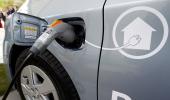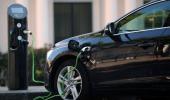If electric cars with a real range of more than 400 km are launched, the anxiety regarding the charging points will come down, and more people will buy EVs.

Electric cars in India are expected to experience a 30 to 40 per cent increase in volume sales in 2024 as demand remains strong with more models across the Rs 8 lakh to Rs 30 lakh price spectrum set to launch and an increase in charging points, says Shailesh Chandra, managing director, Tata Motors' passenger vehicle (PV) and electric vehicle (EV) division.
Chandra, after unveiling the company's first EV-exclusive showroom in Gurugram, told reporters that the domestic sales of electric cars in India would reach 90,000 to 95,000 units in 2023, marking a growth of about 90 to 100 per cent.
Tata Motors holds more than 80 per cent of the Indian electric car market.
The total domestic PV sales for the automotive industry would be about 4.1 million units in 2023. "It would be an annual growth of 7-8 per cent," he added.
The 90-100 per cent volume growth in 2023 occurred because the average price point of an electric car in India has moved downward, especially since the Tiago EV's deliveries began earlier this year.

"Last year, the average price point of an electric car was Rs 17 to 18 lakh, with the Nexon being the leading product. In January, we launched the Tiago EV (at a starting ex-showroom price of Rs 8.69 lakh)," Chandra said.
"There were a few other products (electric cars) that were launched by the competition, but they did not generate that kind of volume, but the Tiago EV did," he noted.
More electric car models at different price points -- between Rs 8 lakh and Rs 30 lakh -- have to come into the Indian market so that people have more options, Chandra said.
According to him, neither the product and its driving experience nor its price point is the problem right now.

"So, what is stopping people? Primarily, these are bottlenecks around charging," he explained, adding that the electric car is still not the first car for many people as they do not have sufficient confidence about the vehicle's range due to a lack of charging points.
To resolve this situation, from the next year onwards, India would see the launch of electric cars with a much higher range.
"About 85 per cent of electric car drives in India are less than 400 kilometre away," he noted.
Therefore, if electric cars with a real range of more than 400 km are launched, the anxiety regarding the charging points will come down, and more people will buy EVs.
Tata Motors is planning to launch the Harrier EV as well as the Curve EV in 2023.
As Tata Motors currently holds over 80 per cent of the Indian electric car market share, it possesses valuable insights into the optimal locations for placing charging points, Chandra noted.
Consequently, the company is supporting private charge point operators (CPOs) by providing information about these strategic points.
"In its initial years, Tata Motors was dependent on only Tata Power to create charging infrastructure. As there are 100,000-150,000 electric cars on road now, there are a lot of startups (CPOs) that are coming up," Chandra said.
"Also, oil-marketing companies are putting about 22,000 EV chargers in place, with government support of about Rs 800 crore (Rs 8 billion), by December 2024," he noted.
Governments, Chandra said, should promote the establishment of common chargers in residential societies across India.
There is currently a 5 per cent goods and services tax on electric cars. Many states in India have waived the road tax and registration tax on these cars.
Other governments across the world have supported the EV industry until its penetration has hit 18-20 per cent. Therefore, until India reaches that point, the government "will have to support" through the aforementioned low taxes, etc, he noted.
The inflexion point -- when a greater share of customers buys electric cars as their first car and when a greater share of people just has an electric car at home -- for the EV sector will come in the next 18-24 months, Chandra predicted.
"Charging infrastructure is one thing. There are going to be more choices at more price points. Higher range. All these will help reach an inflexion point."
Feature Presentation: Ashish Narsale/Rediff.com











